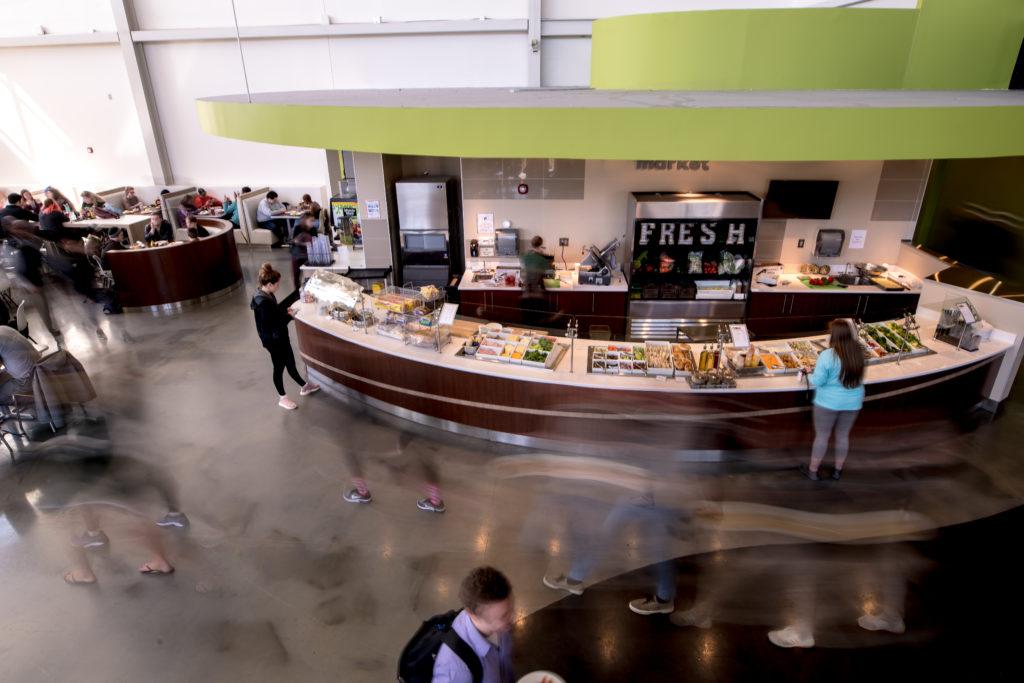
The dining services at Piedmont have dealt with their fair share of scrutiny, but student concerns have grown in recent years.
In the fall of 2017, students took to the Piedmont College app to bring attention to food that they felt was sub-par to the amount of money that they pay for a dining plan, as well as unsanitary conditions in the cafeteria, such as a moldy ice dispenser. On January 29, Piedmont College hosted a meeting between students, Student Life staff, and Chartwells representatives to discuss changes that need to be made.
The meeting ended on good terms with Chartwells promising to take the students’ concerns into consideration. The Piedmont cafeteria soon displayed a whiteboard that allowed students to write suggestions pertaining to meals and what they’d like to see in the cafeteria. For a time, there was a QR code students could scan on the Piedmont App that allowed them to give feedback on their meal.
By all accounts, the fall 2018 semester in the cafeteria looked promising. The Chartwells staff was responsive to the student body; the dessert options seemed beautiful, and many of the foods students asked for became options. Unfortunately, many students have lost all hope for a good semester of food.
Junior Marion Mealor was eating lunch on August 15, the first day of classes, when she noticed something off about her chicken sandwich.
“I took the bun off, and that’s when I saw that the chicken was raw,” she said. “I’d eaten about half of it. I took it up to the lady in the front [of the cafeteria] and I handed her my plate. I said ‘I don’t know who I’m supposed to tell, but this is completely raw.’” The cafeteria employee took the chicken back to Peter Barhdo, Piedmont’s Director of Dining, who was apologetic and took her over to the on-campus Starbucks to compensate for her meal.
“After that, I went back to my dorm,” said Mealor. “At first, I was feeling kind of sick, but I was just like ‘This is just disgust’ which, I’m pretty sure at first it was. I just did my homework and went to bed. At about 3 a.m. I got sick, about 5 a.m. I texted my parents, and they encouraged me to go to the doctor. I went to my 9:30 a.m. class… then I went to urgent care.” Marion had contracted a form of food poisoning that left her ill. Her doctor prescribed the antibiotic Ciprofloxacin; an antibiotic often used to combat Salmonella.
“What happened to [Mealor] was something that never happened before,” Barhdo said. “After she showed us the chicken was uncooked, we pulled the pan from the line. We cooked another pan of chicken and checked the temperature of more than three portions and wrote them in the temperature log. We immediately called a meeting and let employees know what happened. Everyone knew and at the end of their shift they returned the temperature log to the supervisor.”
Although she’s still weary of eating meat in the cafeteria, Mealor believes that Chartwells is doing their best to resolve the problem.
“They let me know that this was an incident, not an epidemic, and they walked me through the process of how they determine that,” she continued. “I felt a lot more comfortable after they explained that to me because I really felt like they did go through a certain protocol to make sure that this wasn’t going to happen to multiple students across campus. They really want the dialogue to continue. I’ve been receiving emails- even today- of them checking on me. I’m pleased with the way they’ve handled it.”








